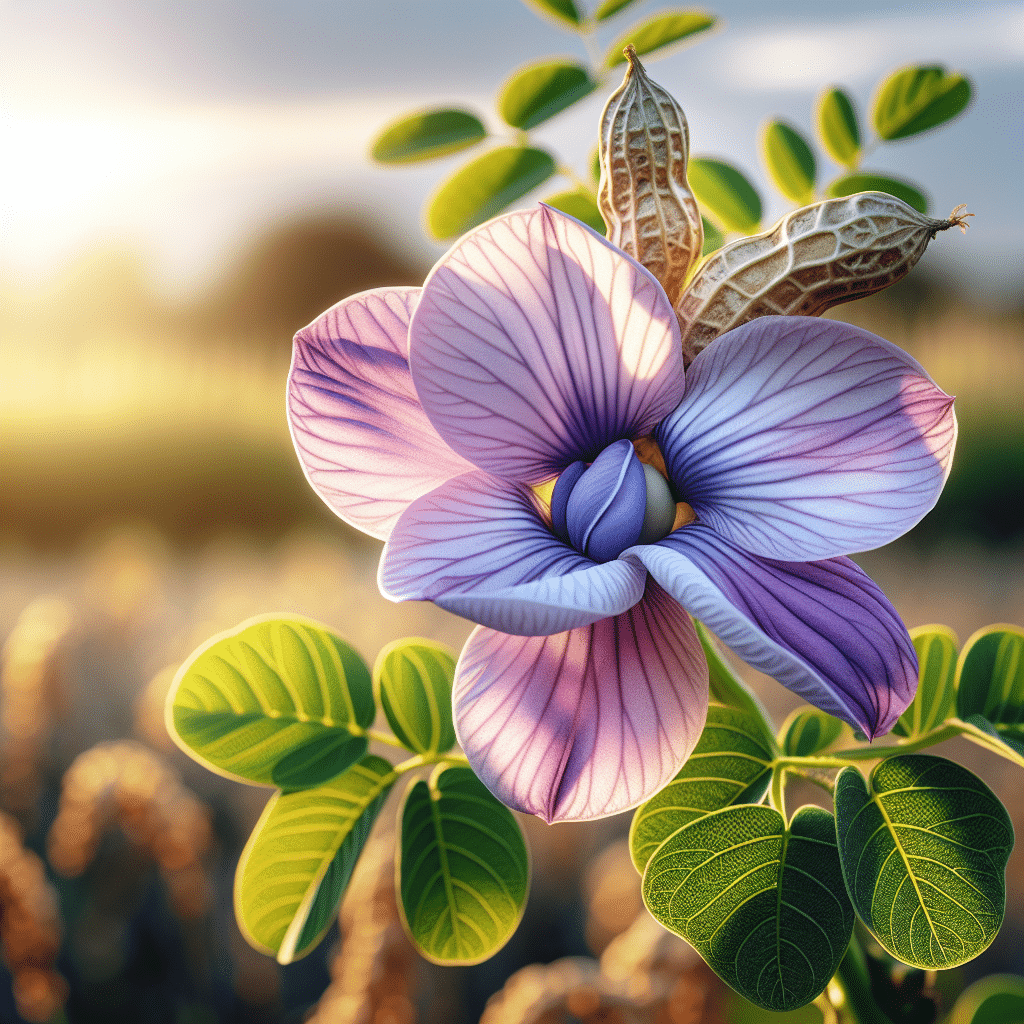Peanut Flower: Blooming Into Nutty Beauty
-
Table of Contents
- Peanut Flower: Unveiling the Nutty Beauty and Botanical Wonders
- The Botanical Brilliance of Peanut Flowers
- Growth and Development: From Flower to Nut
- Ecological Significance and Crop Management
- Health Benefits and Nutritional Value
- Challenges in Peanut Cultivation
- Conclusion: Embracing the Full Spectrum of the Peanut Plant
- Discover the Power of Plant-Based Proteins with ETprotein
Peanut Flower: Unveiling the Nutty Beauty and Botanical Wonders

The peanut, known scientifically as Arachis hypogaea, is a legume crop grown primarily for its edible seeds. Revered as a rich source of protein, healthy fats, and essential nutrients, peanuts play a significant role in global agriculture and cuisine. However, the beauty and botanical intricacies of the peanut flower are often overlooked in the shadow of its popular edible counterpart. This article delves into the world of the peanut flower, exploring its unique characteristics, growth process, and the vital role it plays in the life cycle of the peanut plant.
The Botanical Brilliance of Peanut Flowers
Peanut flowers are a marvel of nature, showcasing a delicate balance between beauty and functionality. They are typically small, bright yellow, and grow in the axils of the leaves. The flowers are self-pollinating, which means they have both male and female parts and can fertilize themselves without the need for cross-pollination from other plants. This self-sufficiency is a key factor in the peanut plant’s resilience and widespread cultivation.
- Structure: The peanut flower consists of a standard petal, wings, and a keel, which is typical of the Fabaceae family.
- Pollination: After pollination, a fascinating process called ‘geocarpy’ begins, where the fertilized ovary elongates and grows downward into the soil to form the peanut pod.
- Adaptation: This unique reproductive strategy protects the developing seeds from above-ground threats and contributes to the peanut’s successful propagation.
Growth and Development: From Flower to Nut
The journey from peanut flower to mature nut is a remarkable process that involves several stages of growth and development. After the flower is pollinated, the ovary begins to enlarge and form what is known as a “peg.” This peg grows down into the soil, where the actual peanuts will develop underground. The entire process from flowering to harvest takes about four to five months, depending on the variety and environmental conditions.
- Flowering: Peanut plants typically start flowering about 30 to 40 days after planting.
- Pegging: The pegging stage occurs shortly after flowering and is critical for peanut development.
- Maturation: The peanuts mature underground over the next few months, shielded from pests and extreme weather.
Ecological Significance and Crop Management
The ecological significance of the peanut flower extends beyond its role in the plant’s life cycle. Peanut plants are known for their nitrogen-fixing abilities, which improve soil fertility and benefit subsequent crops. Additionally, the cultivation of peanuts can have a positive impact on local ecosystems by providing habitat and food for wildlife.
Effective crop management is essential for maximizing peanut yield and quality. Farmers must consider factors such as soil type, irrigation, pest control, and proper harvesting techniques to ensure a successful peanut crop. The timing of planting and harvesting is particularly crucial, as peanuts require a warm climate and well-drained soil to thrive.
Health Benefits and Nutritional Value
Peanuts are not only a culinary delight but also packed with health benefits. They are an excellent source of protein, healthy fats, vitamins, and minerals. The nutritional value of peanuts contributes to various health benefits, including:
- Heart health: Peanuts contain monounsaturated and polyunsaturated fats, which are beneficial for heart health.
- Weight management: The protein and fiber content in peanuts can help with satiety and weight management.
- Disease prevention: Antioxidants and other bioactive compounds in peanuts may reduce the risk of certain diseases.
Challenges in Peanut Cultivation
Despite the many benefits of peanuts, there are challenges associated with their cultivation. Pests and diseases, such as the peanut worm and leaf spot disease, can significantly impact yield. Additionally, aflatoxin contamination, caused by certain fungi in the soil, poses a serious health risk if not properly managed. Farmers must employ integrated pest management strategies and adhere to strict harvesting and storage practices to mitigate these challenges.
Conclusion: Embracing the Full Spectrum of the Peanut Plant
In conclusion, the peanut flower is a key component of the peanut plant’s life cycle and an emblem of the intricate relationship between botanical beauty and agricultural productivity. Understanding the growth process, ecological significance, and challenges of peanut cultivation allows us to appreciate the full spectrum of this remarkable plant. As we continue to enjoy the nutritional benefits of peanuts, let us also acknowledge the humble flower that blooms into the nutty beauty we know and love.
Discover the Power of Plant-Based Proteins with ETprotein
If you’re inspired by the natural wonders of the peanut flower and its nutritious seeds, you’ll be pleased to know that ETprotein offers a range of high-quality plant-based protein products. Whether you’re looking for organic rice protein, clear pea protein, or peanut protein, ETprotein has you covered. Their products are non-GMO, allergen-free, and perfect for various industries, including food and beverage, sports nutrition, and health and wellness.
Choose ETprotein for your protein needs and experience the benefits of plant-based nutrition backed by a trusted Chinese manufacturer and supplier. Contact ETprotein today to sample their products and elevate your health with the power of plants.
About ETprotein:
ETprotein, a reputable protein Chinese factory manufacturer and supplier, is renowned for producing, stocking, exporting, and delivering the highest quality organic bulk vegan protein and plant proteins. They include Organic rice protein, clear rice protein, pea protein, clear pea protein, pumpkin seed protein, sunflower seed protein, mung bean protein, peanut protein etc. Their offerings, characterized by a neutral taste, non-GMO, allergen-free attributes, cater to a diverse range of industries. They serve nutraceutical, pharmaceutical, cosmeceutical, veterinary, as well as food and beverage finished product distributors, traders, and manufacturers across Europe, USA, Canada, Australia, Thailand, Japan, Korea, Brazil, and Chile, among others.
ETprotein specialization includes exporting and delivering tailor-made protein powder and finished nutritional supplements. Their extensive product range covers sectors like Food and Beverage, Sports Nutrition, Weight Management, Dietary Supplements, Health and Wellness Products, and Infant Formula, ensuring comprehensive solutions to meet all your protein needs.
As a trusted company by leading global food and beverage brands and Fortune 500 companies, ETprotein reinforces China’s reputation in the global arena. For more information or to sample their products, please contact them and email sales(at)ETprotein.com today.












